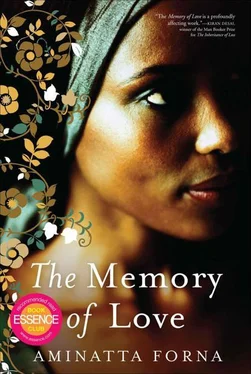And today, another letter from Tejani, the second in just a few days. He has yet to reply to the last, though he has composed several different versions in his head. The timing of the letters’ arrival is down to the vagaries of the post, the actual dates are two weeks apart. He spreads them both out on the coffee table in front of him, helps himself to a pen and paper from Adrian’s store and sits down to write. In his first letter Tejani writes of awaiting the results of his first-stage professional surgical exams, of which he is tentatively hopeful. The second letter is much shorter:
Well, I did it, bro! I did it! Christ, though, I wish you’d been here. I had to put in a couple of all-nighters there at the end. Remember that time we did three in one week, until we ran out of candles? We sneaked into Mo’s room and took his battery light and got it back in the cupboard in the morning. Man couldn’t figure why the thing had run out of juice. And the palaver in front of the Vice Chancellor’s office, when we went to hand in the petition. Those were the days, I was telling Helena about it. She can relate, being from Belarus. But I tell you, you should be here. You’ve got the qualifications and they’re crying out for people like you and me, man. I can give you any help you need, but the agency handles it all anyway. Don’t worry about where to stay. This place has a couch with your name on it. But seriously, if I get this job, I (we) am going to buy us a place and then you’ll be welcome any time. Don’t leave it too late. Kai man, I miss you .
If you go down to Mary’s have a beer for me. Tell her ‘how do’ and that I’m doing good. Tell her I miss her food. Tell her I miss her big, beautiful tumbu.
Your brother ,
Tejani .
At the bottom of the page, a postscript had been added using the same pen, but in a different hand.
PS. This is Helena, TJ’s friend. TJ tells me about you all the time. This is true. I very much look forward to one day when we meet .
Kai starts to write and stops. It has been two years now and still he feels Tejani’s absence, feels it in his soul, a yearning, cold and hollow. When Tejani left for America, they’d punched fists at the ferry port, making believe Tejani was going away for a few weeks. ‘When you get there send something small for me,’ Kai joked. They had turned away from each other. Kai thought of nothing but the next hour, the next day. He did not let himself think, was incapable of thinking, further than that. Tejani could, though. He had gone.
They’d always planned to leave together.
In the end he pens a paragraph congratulating Tejani on his exam pass, on being one step closer to membership of the elite professional body, which is his ambition.
He lays down the pen and sips his coffee, not knowing how to finish the letter. He should just take up Tejani’s offer, send over his résumé. The coffee is tepid. He drinks it hastily, a half-hour has passed. From the table he picks up and pockets all three letters and lets himself out.
Minutes later he enters the ward. A nurse passes carrying a kidney bowl of swabs and a pair of forceps. She nods at him.
‘He just opened his eyes. I was on my way to get him something to drink. Over there.’
‘Hello, Dr Mansaray.’ Foday’s voice is husky.
‘How are you?’
‘I’m fine, thank you, Doctor.’ A small grin. Kai can see how hard Foday is struggling to keep his eyes open.
‘I just wanted to tell you everything went well. So fingers crossed, hey?’
‘I will pray for that.’
‘We’ll take a look at that leg in a day or two, just to make sure everything’s all right. May I?’ Kai pulls the sheet down to uncover Foday’s leg. The young man pulls himself up using his powerful arms and shoulders. From there he looks down at his legs, reaches to touch the cast. ‘And we’ll get you a wheelchair for the time being.’ With those arms Kai doesn’t doubt Foday will be able to wheel himself anywhere he wants to go.
‘Yes, Doctor. May God bless you.’
Above the bed a photograph is tacked to the wall, one Kai has seen before. A Polaroid, taken around the time Foday was admitted to the hospital. It shows his legs from the waist down before the two operations. The weak calves, angulated from the knee, the feet below turned in upon themselves. Not one but two congenital abnormalities of the lower limbs. Blount’s disease and talipes in both legs, plus a dislocated kneecap, which had floated around the side of his left leg. By contrast, above the knee, the thighs had the muscularity of a sprinter. His chest and his arms were massive. Unbelievably, Foday walked.
Four operations, then. Two to straighten the calves. Two to correct the ankles. And then the months of physiotherapy. Kai has no doubt Foday will see it through. He is a fighter.
A surgeon, recently arrived from Geneva, had passed by as Kai was examining the X-rays, stopped to look. He had been both shocked and excited.
‘Do you know how often we see this in Switzerland?’
‘How often?’ Kai obliged.
‘Never. Not once in my career. Tell me when you’re operating. I’d like the opportunity to observe. If I may?’ And he had bowed slightly, as though Kai was the senior of the two.
The war was medieval neither in concept nor in tactics, whatever the view from elsewhere, only in the hardware. From the outset the patients came in two classes. There were the soldiers and foreign peacekeepers, victims mostly of gunshot wounds, sometimes grenade and mortar wounds. In the second class were the peasants, the ones who somehow made it from their villages and were admitted with a C scrawled heavily on their charts. Unarmed and poor, the waste of a bullet wasn’t so much resented as simply unnecessary. They were the victims of attacks using machetes and cutlasses. C . The doctor’s own shorthand adapted to the circumstances. C. Cleaved . Kai gained hundreds of hours of experience in repairs, stitching layers of muscle, sewing skin, patching holes with pieces from elsewhere. Surgical housekeeping. Late in the war, the rebels advanced upon the capital and in advance of them came the first of the amputees. Mostly the team of surgeons concerned themselves with saving lives, cutting away necrotised flesh, repairing the ‘hatchet jobs’, the way they once, in peacetime, referred to the work of lesser surgeons. Though there were occasions, a few, when the attackers had been either merciful or inept, when it had been possible to reattach a tendon and restore a walk. Later a team of surgeons including Kai practised the Krukenberg intervention, unused since the First World War, fashioning out of the muscles and two bones of the wrist a pair of blunted pincers: a hand. Ugly, it was true. But Kai had seen a man once again able to hold his own penis when he pissed, a mother place a nipple into her child’s mouth. In those months of turmoil, Kai had discovered a new and enduring love, of orthopaedic surgery. Still a junior surgeon, he had seen and dealt with more than some consultants of thirty years.
Six o’clock now. Kai heads for the men’s changing room, where he exchanges his scrubs for day clothes. Now he is hungry. On the way home he stops at the roadside and buys okra, onions, peppers and smoked fish from the women traders. No meat, too late for the butchers. He hails a taxi, a shared one, and checks the route. The driver is going via the peninsula bridge. Kai lets him go, waves the next taxi down.
On his way up the road towards the house he sees Abass hanging over the verandah railings. Kai raises a hand. The boy turns to rush down the stairs. As Kai opens the door in the metal gate, the child hurtles towards him throwing his full weight against his stomach, arms around his waist. Kai braces; all the same the impact very nearly winds him.
Читать дальше












